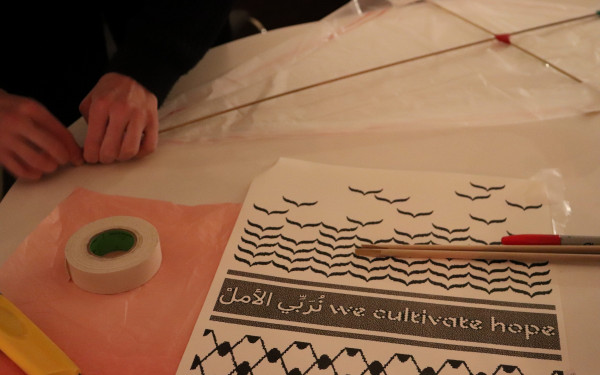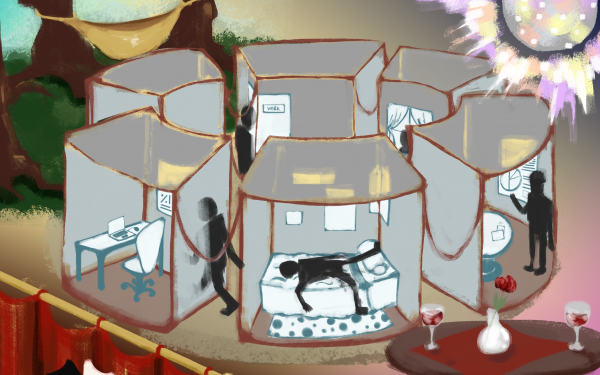The future of Fringe
The MainLine Theatre looks ahead to a post-closure future
After two decades at the MainLine Theatre on St. Laurent Blvd., one moment stands out to Amy Blackmore.
“It's sitting in the theatre in my favourite seat at the beginning of The Rocky Horror Show, when the lights go down and the band starts to play the opening bars to ‘Science Fiction/Double Feature,’ and you feel the audience ready and waiting for it,” Blackmore said. “It's like my heart explodes.”
Blackmore has spent the last 14 years as executive and artistic director of both the Montreal Fringe Festival and MainLine. Her favourite seat in the MainSpace—top row, right corner—even has a plaque with her name on it.
This year marks MainLine’s 20th anniversary as a venue for English-speaking independent arts and the host of the Fringe Festival. But in lieu of celebrations, Blackmore made the tough call to close its doors.
“It was not a decision that we made lightly at all—the decision to close,” she said, “but to close with purpose and celebrate what we've built here and prepare for what's next.”
MainLine will run shows until June 30, ending with one final Fringe season. Blackmore and her team are seeking a new space to carry on the spirit of the Fringe.
“I was actually very excited [about the closure] in the sense that we've outgrown the space, and working in it has been quite interesting,” said Laurence Côté, artist relations and operations manager at MainLine. “I got into this solving mode that I usually am in.”
A tough past few years
The pandemic hit MainLine hard.
“It was a Saturday, I was here in my office, and we had to tell the artists in the MiniMain (the smaller theatre and rehearsal space) and in the MainSpace (the bigger theatre) that they could not perform their shows that night,” Blackmore said. “It was such a devastating moment.”
The team quickly pivoted, turning the MiniMain into a residency space.
“We were really fortunate that the government helped us get through it with the wage subsidies and the rent subsidies,” Blackmore said. “I was really committed to making sure that we kept our employees, that we were able to stay open and make it through.”
Then, one day before World Fringe Day in July 2024, record rain from Hurricane Beryl flooded the theatre.

“I was on a train going on vacation and somebody called me and said, ‘Amy, there's a leak in the lobby,’ and I was like, ‘Oh, just go grab a bucket,” Blackmore recalled. “Then I get another phone call from someone at MainLine, and they're like, ‘Amy, the water is gushing in, we need 40 buckets.’ The worst thing was sitting on the train, coordinating the staff and calling the landlord and figuring out what to move, what to save.”
A fundraiser launched shortly after received strong community support.
“We raised [over] $75,000 in the end, and again, the actions of our community and the outpouring of love is what really motivates us here,” Blackmore said. “The money raised is what's allowed this final season at MainLine to take place.”
Looking for a new space
According to Blackmore, the MainLine building was never ideal: It is not wheelchair accessible, is freezing in the winter and simply “isn’t what it used to be.”
“We're really good at Band-Aids—the people who are around this space come from a DIY grassroots punk background,” Blackmore said. “We make things happen, but at a certain point, Band-Aid [solutions] don't work anymore.”
She hopes to keep the Fringe Festival in the Plateau-Mont-Royal, which she says is “an integral part of the identity and the DNA of the Fringe.”
After the February closure announcement, Blackmore said support poured in.
“I felt like we broke the internet that day,” she said. “My phone was exploding, my email was exploding. I always knew the MainLine has been important to me, but to hear the outpouring of love and respect from everyone else, it blew my mind.”
Community members even offered leads on new venues.
“I'm planning right away to take folks up on their offers, go check out some spaces,” Blackmore said. “[The search] is active. It's happening in the background, because we do have a Fringe Festival to produce.”
The Fringe community
For Blackmore, MainLine is about more than the building.
“It's about the people, it's about the arts, but it's really about the community that we cultivate around the arts and the values that we have,” she said.
For Côté, MainLine was her springboard into producing. After graduating in 2021 from Concordia University’s acting for theatre program, she moved in and out of the MainLine sphere. In 2023, she produced her first show, “After Grim: Healing Happens Here,” at Fringe 2023.
“I really soaked up all the opportunities that Fringe gave me,” Côté said. “I was at all the workshops, all the events, and I feel like it really helped propel me as a producer.”
Drag performer Patrick Dale, a.k.a. Little Star, also found their footing at MainLine after starting at Concordia’s performance creation program in 2018.
“I immediately was struck by the vibe and the community energy,” they said. “It's been like a through line for my emergence, not only as an artist, but as a person, too.”
Little Star directed and choreographed Sweet Charity at MainLine, and first performed there as Magenta in The Rocky Horror Show, a role they’ve since become known for.
The final act
MainLine is booked until June 30. Côté’s recommendations include The Last Montreal Slow Dance, a Marianopolis rendition of Hadestown, and Fringe for All on May 26.
Little Star will also perform their solo Fringe show, “Little Star: Born of Desire.”
“Forty-five minutes, fully lip-synced, four acts—it's all me,” Little Star said with a chuckle. “Basically, it's my introspective and abstract look of where my drag journey has taken me.”
Community support remains strong. The weekend before Blackmore sat down with The Link, MainLine hosted two sold-out shows in one night.
“The lobby was packed,” Blackmore said. “I sat in my favorite seat in the theatre and I watched the musical Amélie. It was just such a great moment.”
Looking ahead, she’s taking her time.
“My real hope is that our next space isn't a Band-Aid space,” Blackmore said. “I would really love to find a permanent home for what we do, and that's why I think it is gonna take a bit of time, because it's got to be the right fit.”
This article originally appeared in Volume 45, Issue 12, published April 1, 2025.







